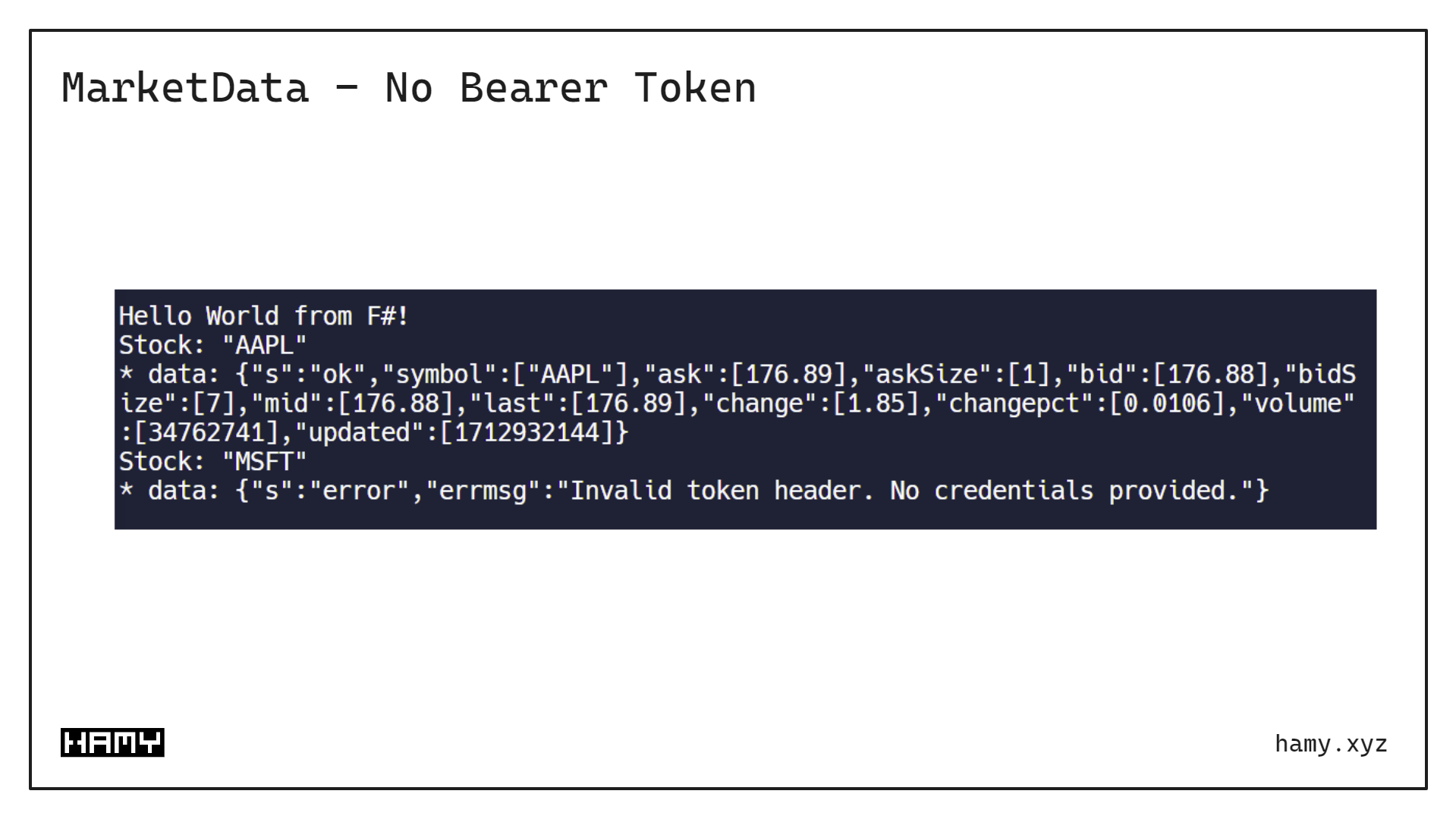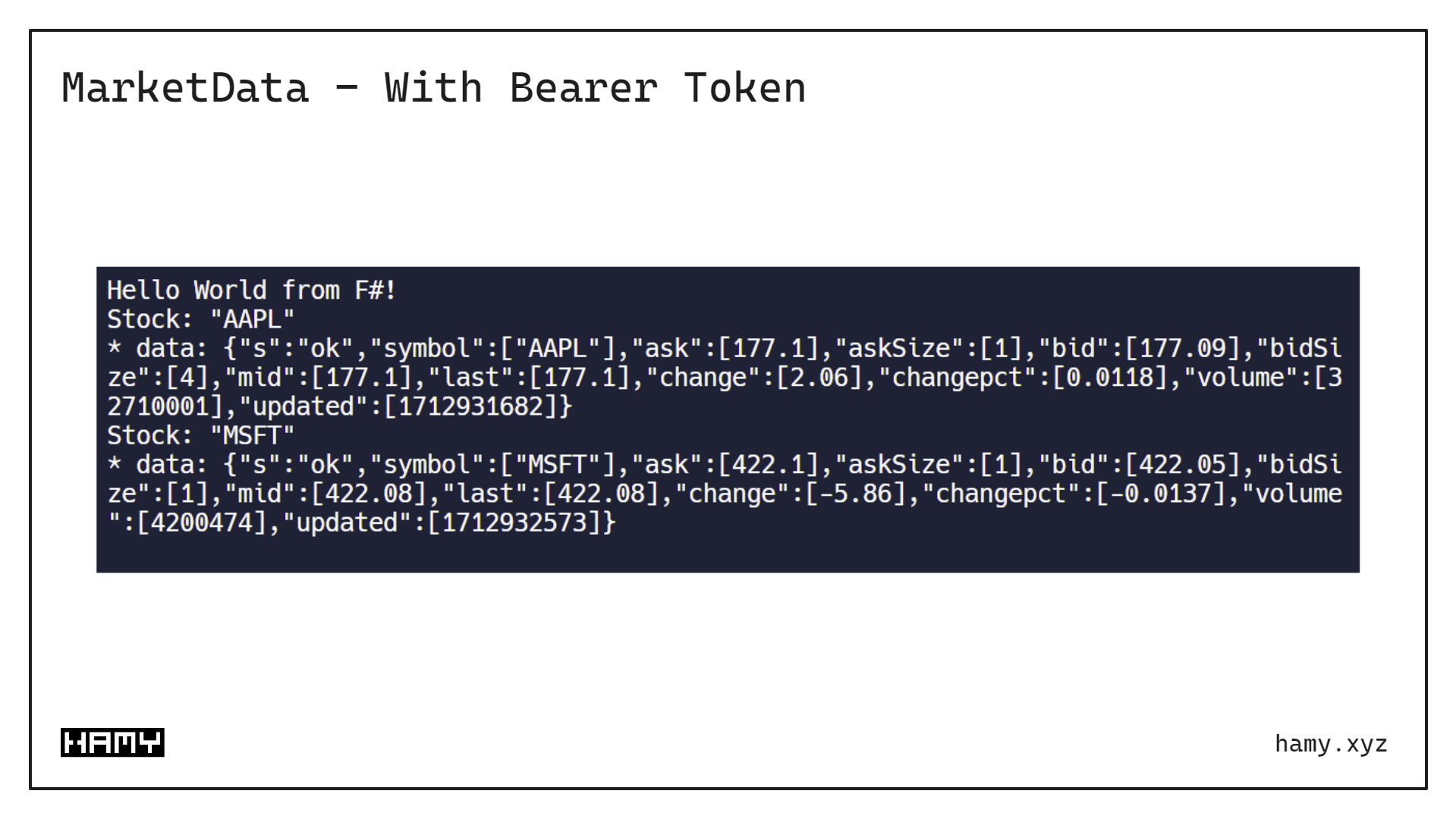How to make HTTP Requests with an Authorization Bearer Token in F# using FsHttp
Essay - Published: 2024.04.29 | 2 min read (641 words)
create | fsharp | http | options-scanner | tech
DISCLOSURE: If you buy through affiliate links, I may earn a small commission. (disclosures)
Most web projects will talk to other services using HTTP requests. Many services will require tokens or keys to identify and authorize requests to prevent abuse. One method for including tokens on HTTP requests is the Bearer Token.
F#'s FsHttp library allows you to make HTTP requests in an ergonomic, functional way. In this post we'll explore how to make an HTTP request with FsHttp that includes a Bearer Token.
Want to build fullstack apps with F#? I use the CloudSeed project boilerplate to jumpstart all my F# web projects.
FsHttp Example Project
To show how this works we'll be using an API that requires a bearer token. I'd thought about building a full project to demonstrate this but that seemed too complicated so instead we'll be using a real API in the real world.
The MarketData stock market API (referral) provides access to near real time stock market data. I recently used it to build my Stock Options Scanner app and it requires a bearer token for all non AAPL stock lookups which makes it a good candidate to demonstrate that this bearer token method actually works.
Inputs:
- Configure API token
- Configure stocks to pull
Processing:
- Pulls latest stock data for configured stocks using HTTP request with bearer
Outputs:
- Received data
As we'll see:
- With Bearer - all data
- Without Bearer - only AAPL
Make an HTTP Request with a Bearer Token using FsHttp
Making a Bearer Token is easy - it's really just a string (similar to an API key) so all we have to do is add it to the request. We can do this with FsHttp by including the AuthorizationBearer attribute in our HTTP request builder.
let makeHttpRequest stockSymbol =
http {
GET (createMarketDataQuoteUrl stockSymbol)
AuthorizationBearer marketDataToken
}
|> Request.send
|> Response.toJson
This code:
- Creates a request to the MarketData API and adds the Bearer Token
- Sends the Request
- Converts the response to JSON
We can prove this works by looking at the responses with and without the bearer token - here looking up AAPL and MSFT stocks.
With an empty token - we can only get the AAPL data, MSFT fails.
With a valid token - API gives us all the stock data we asked for.
Full Source Code
You can find the full source code in my Replit instance (though you'll have to get your own API key, sorry).
Here's a snapshot of that code for posterity:
open System
open FsHttp
// You must input your token here to auth
let marketDataToken = ""
let stocksToPull =
[
"AAPL" // Free - no token needed
"MSFT" // Not free - token needed
]
let createMarketDataQuoteUrl
(stockSymbol: string)
: string
=
$"https://api.marketdata.app/v1/stocks/quotes/{stockSymbol}/"
let makeHttpRequest stockSymbol =
http {
GET (createMarketDataQuoteUrl stockSymbol)
AuthorizationBearer marketDataToken
}
|> Request.send
|> Response.toJson
[<EntryPoint>]
let main argv =
printfn "Hello World from F#!"
stocksToPull
|> List.iter (
fun s ->
let response = makeHttpRequest s
printfn "Stock: %A" s
printfn "* data: %A" response
)
0 // return an integer exit code
Next
If you're curious I've written about How I built a Stock Options Scanner in F# and HAMINIONs members can get full access to its source code.
Q: What are you struggling with / curious about around building fullstack apps with F#?
If you liked this post you might also like:
Want more like this?
The best way to support my work is to like / comment / share this post on your favorite socials.
Inbound Links
Outbound Links
- How I built a Stock Options Scanner in F#
- HAMINIONs - Exclusive access to project code and discounts
- CloudSeed Quickstart (Fullstack F# app in 10 minutes)
- The HAM Stack - A Simple Scalable Tech Stack for building modern web apps fast and cheap
- How I host my Server-Side-Rendered F# site on Google Cloud for less than $1 per month


